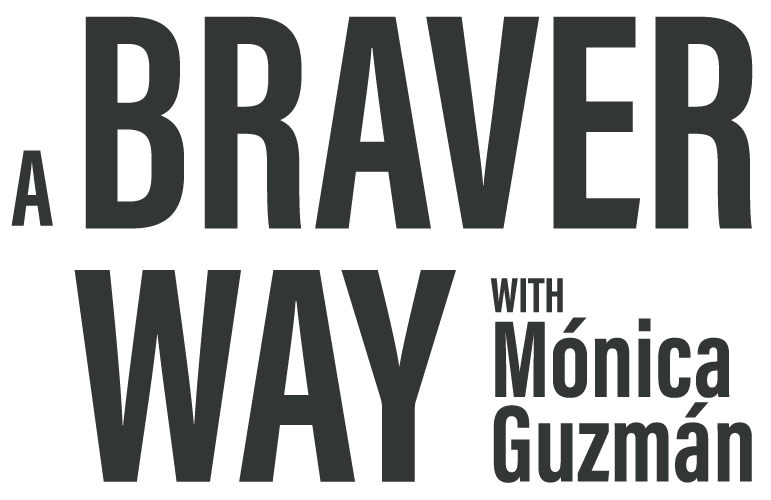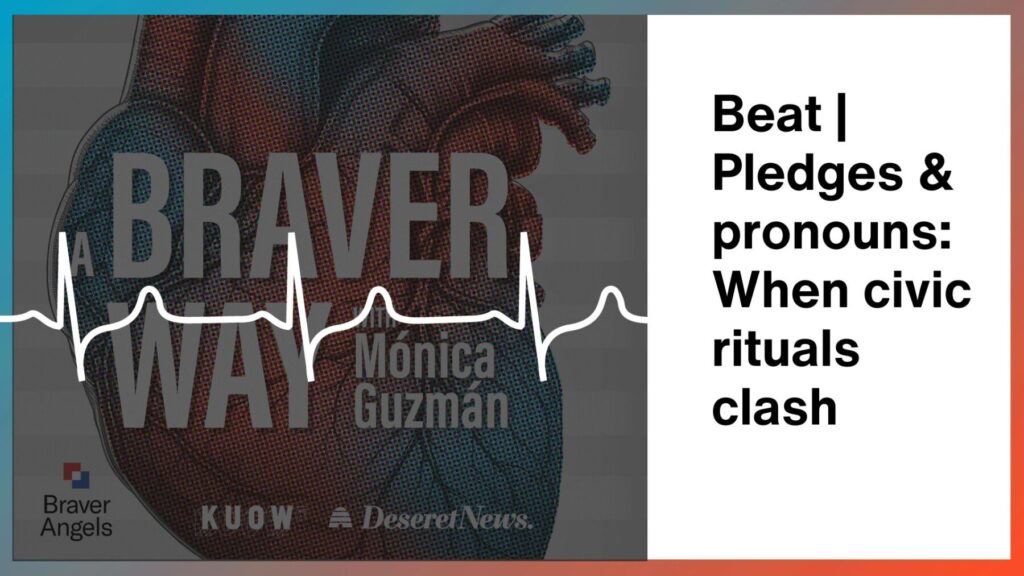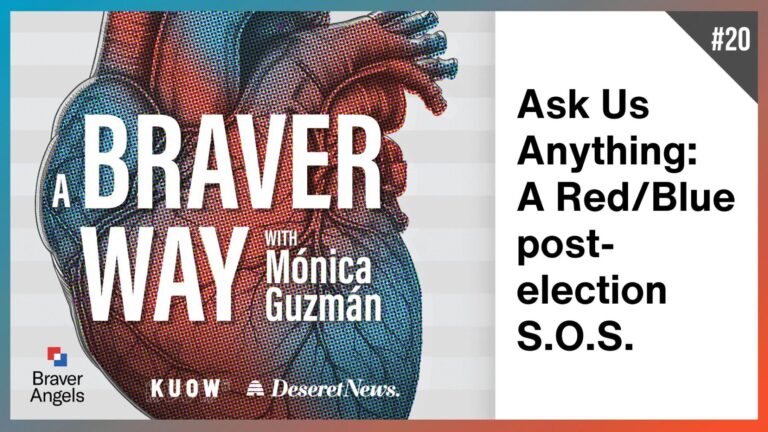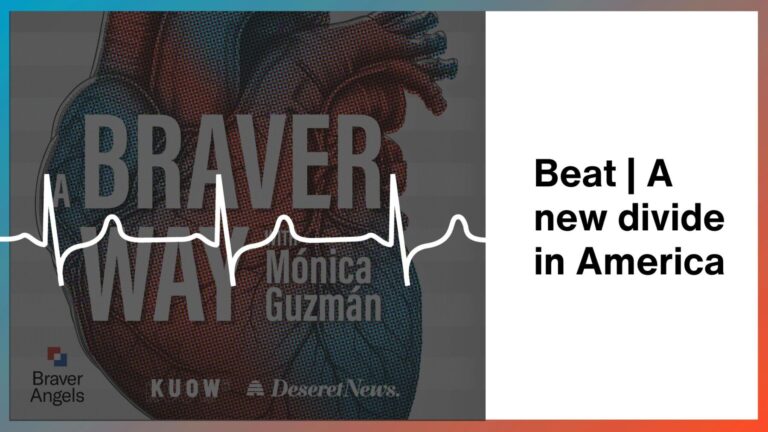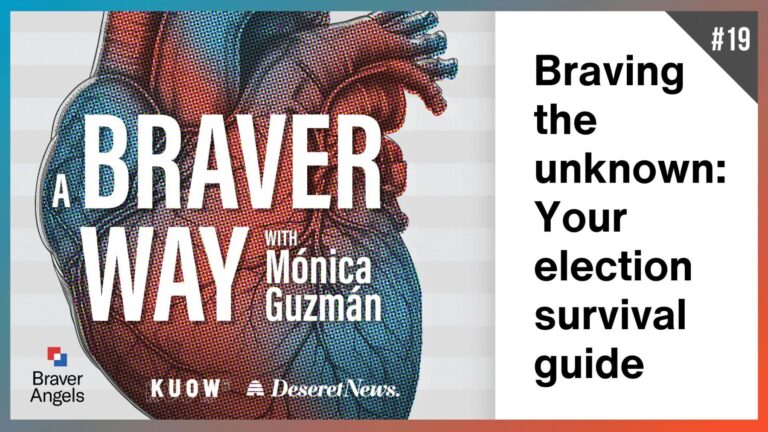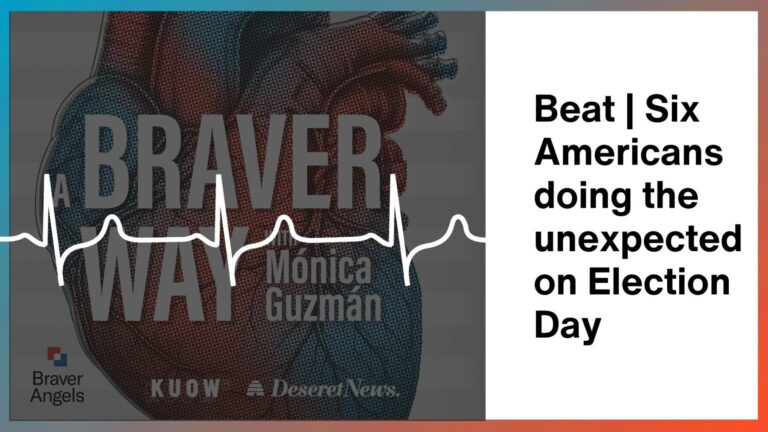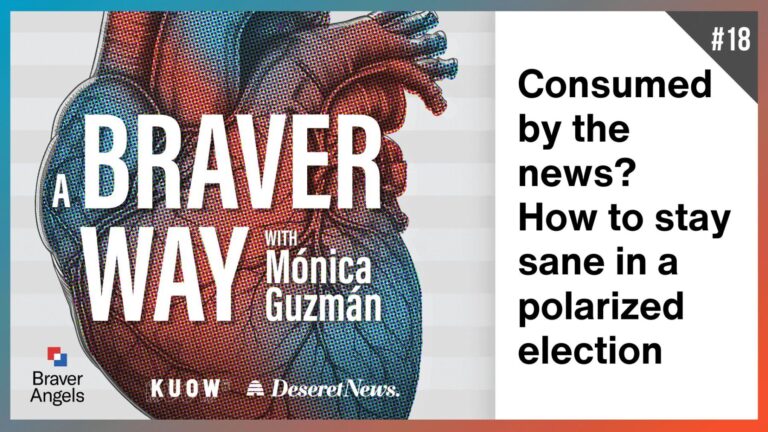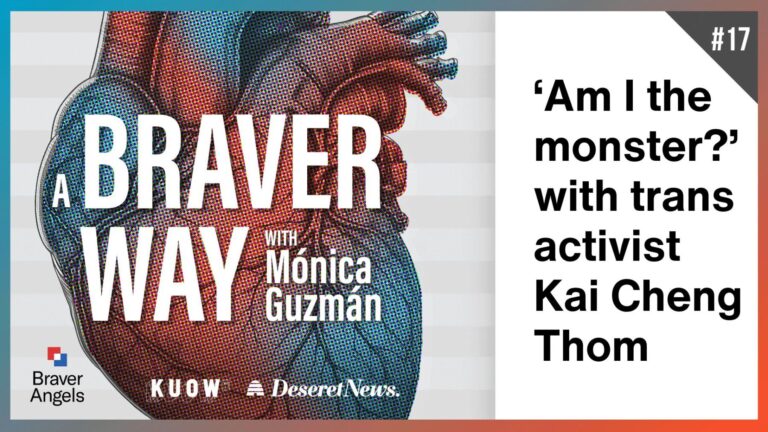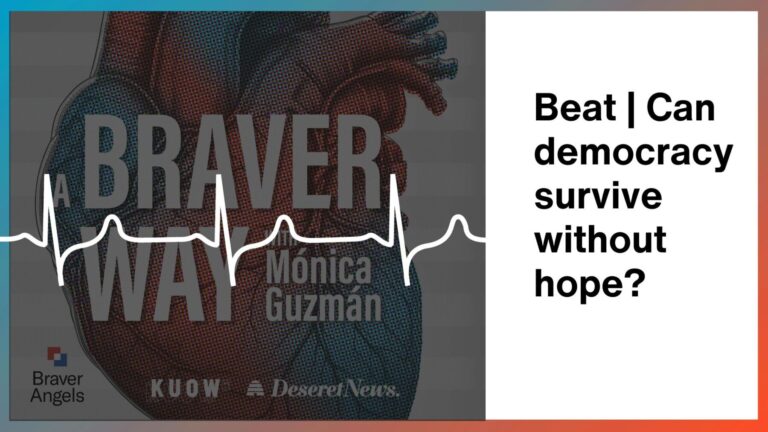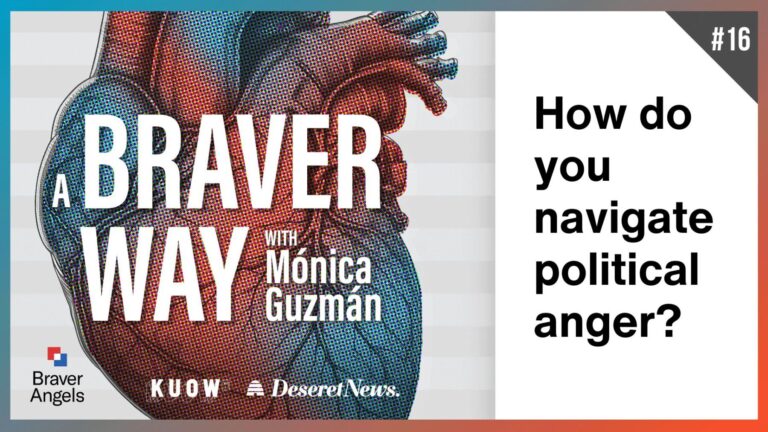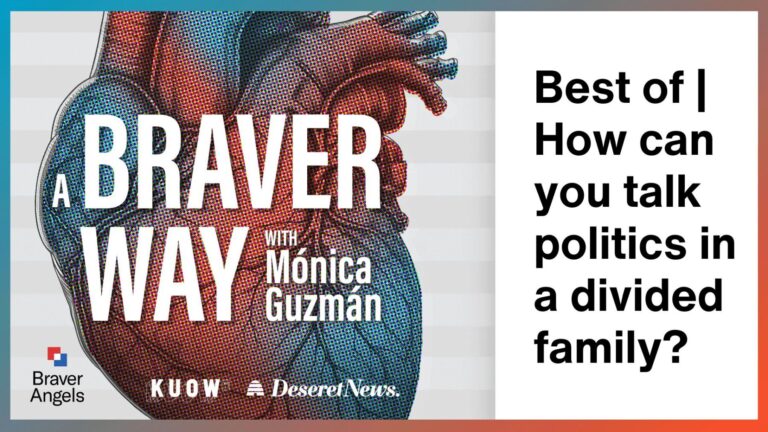It might have been the prayer, the land acknowledgment, the Pledge of Allegiance, or the moment everyone started sharing their pronouns. But opening rituals that disagree with you can leave you feeling shut out. So what do you do when the culture of a group you want to belong to goes somewhere you can’t follow? We talk with Braver Angels leader Steve Saltwick about the clashes that come up for conservatives in particular, and what it looks like to acknowledge someone else’s framework without abandoning your own.
Host: Mónica Guzmán
Senior Producer & Editor: David Albright
Producer: Jessica Jones
Contributor: April Lawson
Artist in Residence: Gangstagrass
Cover Art & Graphics: Katelin Annes
Show notes: Ben Caron and Don Goldberg
A production of Braver Angels
Financial Supporters: M.J. Murdock Charitable Trust and Reclaim Curiosity
Sponsors: USAFacts
Media Partners: KUOW and Deseret News
- Lorem ipsum dolor sit amet, consectetur adipiscing elit.
- Lorem ipsum dolor sit amet, consectetur adipiscing elit.
- Lorem ipsum dolor sit amet, consectetur adipiscing elit.
- Lorem ipsum dolor sit amet, consectetur adipiscing elit.
- Lorem ipsum dolor sit amet, consectetur adipiscing elit.
Submit a question: If you’ve found yourself mulling on a concern or reflection as you’ve listened, turn it into a question and share it with us in a quick email to abraverway@braverangels.org.
Subscribe: If you like what you’ve heard, hit subscribe, and leave us a 5 star review!
Share this episode:
Follow us: Instagram | X/ twitter | TikTok | Youtube
Join our text line: Text “brave” to 206-926-9955 to join
Join Braver Angels: Become a Braver Angels member
All of our supporting partners are members of Braver Network.
BridgeUSA is a multi-partisan student movement that champions viewpoint diversity, responsible discourse, and a solution-oriented political culture. We are developing a generation of leaders that value empathy and constructive engagement.
(music under)
Mónica Guzmán:
This season we are proud to be partnering with two fantastic media organizations to help us reach more listeners like you. KUOW is Seattle’s NPR news station and Deseret News is a multi -platform newspaper out of Salt Lake City. Help us by helping them. Learn how at KUOW.org/brave or Deseret.com/subscribe.
(music change and under)
Hello all, and welcome to three weeks until the 2024 election. Yes, I did just say three weeks. So of course, everyone is thinking about the vote. The thing. The everything. The be-all, end-all civic act that involves each one of us voters and a collective holding of breath.
But follow me for a second because when you step back a bit a lot of the twists, turns, and attitudes that shape our daily lives don’t come down to a private me and my ballot moment of truth every year or four Those things are proposed and debated and sometimes agonized over in a messier and totally everyday context: groups.
I’m talking about community meetings, PTA meetings, club events of all kinds, discussions or trainings hosted by a church, a non -profit, a civic group, local media, city hall, you name it.
I say at the top of every episode that across this country we are proudly conservative, liberal, independent, or just ourselves. (music out) And that we don’t want to be at war in America. We want to be at home. We want what we think to matter. We want to just belong. Which brings me to the heart of this week’s beat. (heartbeat sfx)
When the ideas that divide people are turning up everywhere there are people, how do you make sure that a gathering that’s meant to be a meeting of minds doesn’t devolve into a clash of cultures? And when the whole flavor of a group you wanna participate in goes somewhere you can’t follow, how do you deal?
My guest today is my friend and colleague, Steve Saltwick. Now a lot of people, myself included, came to political bridge building at least in part because of the dysfunction we’re coming up against daily out there. But for Steve, oof, it’s visceral. This is a guy who, when he sees problems, he just gets to work.
So the ideas we don’t consider, the solutions we don’t find, the work we don’t all do because we think our political differences are too debilitating, is a knot I’ve seen him try to untangle like no one else.
(music under)
Before he started, what is now the largest local Braver Angels group in Austin, Texas, and led national scale projects to unpack this problem, he wasn’t sure he could work with the other side either. Here’s Steve talking about the moment at his first Braver Angels workshop that changed all that.
Steve Saltwick:
Up comes an Uber, out of the Uber gets a dude with long hair, you know I mean registers as a Blue. I’m going I don’t know if I would ever talk to this guy in real life. And then we have this exercise called the fishbowl about well “what do you know what do you think is strong about your policies in the in the country and what are your reservations” right? And I had said you know I think the Constitution is wonderful.l I think we really ought to respect it. I wanna make sure we don’t forget all the good things we’ve done as a country, but there’s a lot of things we gotta fix and work forward. And this guy comes up, my liberal dude, and says, you know, I think the Constitution is wonderful, and that got me shocked at that point, right?
And he said, you know, and I know, I know we gotta work on a lot of stuff, but I don’t wanna, and I know we’ve done a lot of good stuff, but I don’t wanna forget all the work we’ve gotta do, right? So it hit me at that point, this is two sides to the same coin. We both want to work to make the country a better place. We just have different perspectives on how to get there.
Mónica:
In some candid conversations Steve’s had with people across the country about the groups they show up for, and in his own life and work too, He’s noticed a sticking point that can be pretty tough to talk about.
Steve:
If that happens to me And I know this personally and I know this from my friends it chills the speech. You’re not as likely to contribute if that’s the first thing that hits you before you get into the discussion.
Mónica:
So what is he referring to? What is he seeing that’s chilling speech? Well, there’s a couple examples. He gives But here’s the first one.
Steve:
The dilemma I think is, and I think this is very, very common in some places, right, is this ritual of opening a meeting with what are your pronouns. That statement asserts a given worldview on gender identity. That is not an accepted view of everybody, myself included, right? So from the start it’s like wait a minute this this is setting up a framework that I don’t agree with right? And that’s a that’s a challenge. That’s a problem. We all welcome people who have want to use pronouns you know to work on hard problems that’s not the issue. It’s making me share quote my pronouns which sets up a framework that I fundamentally don’t agree with. So it chills speech. If you’re gonna be the guy that doesn’t do it, right? I mean, man, now you’re in the out group.
Mónica:
Ah.
You know, you’re in the out group, right? They’re the them and we are the us. And that’s not a good way to start a dialogue on addressing a problem that all could contribute to.
Mónica:
Steve brought up another ritual that often starts meetings these days, land acknowledgments.
Steve:
If you want to acknowledge Native American contribution, great, do that, but don’t do it with this land was stolen, you know, and it’s just, it is stated as a fact. And why are we opening up with something that’s an argumentative point versus, you know, let’s all acknowledge the contribution to American culture or society or whatever it is from Native Americans. I’d sign up for that in a minute
Mónica:
Right, well, let’s talk about that.
Steve:
Alright.
Mónica:
Because I know, you know, given that you and I are both in “Braver Angels,” we get a lot of familiarity with how our other side thinks of things. So can you speak to the peace about land acknowledgments that is a good intention?
Steve:
Yeah, I mean, the thing that “Braver Angels” has taught me at the core is that people have very, very different political outlooks. I mean, strongly held political outlooks still have the good intention of trying to help America, the country they love. Okay, now we have different ways of going about it. We have different, you know, ways we talk about it. We have different words we use. We have all that kind of differences, right? But at the core, we have the good intention to try to make our communities and our nation better. Great, it’s gonna take all of us to do that. And if we keep the conversation focused on that, then all this stuff goes away. I think. Right? And there’s strategies you can use to kind of make sure you don’t get hung up in that and all that.
But the thing that really helps me in my personal life is this, you assume good attention until proven otherwise. And it is amazing how many people have good intentions to move this forward, whether they use their pronouns or whether they do land acknowledgements and all that. But you gotta get to where you have that dialogue, right?
Mónica:
So what occurs to me is, this conversation is about feeling unwelcome from the start and what I know of the best intention of sharing pronouns and trying to make it a norm of everyone shares pronouns, and the best intention of land acknowledgments, you know, saying something about the stewards of the land, what came before, a kind of gratitude that is a part of kind of a cycle of healing, that’s the idea, is that both of those things are designed to welcome people too. And so it’s almost like what you’re saying is, yeah, but it’s like you’re welcoming people by putting up a divide, by putting up a wall, that if you’re not, like you said, bought in, if you’re not seeing that as a welcoming gesture, if you’re not agreeing with that as a welcoming ritual, then the thing that is designed to welcome people into a space ends up pushing you away all the more. And so it, it feels like such a dilemma. And I wondered if you could speak to that.
Steve:
Yeah, I mean, I think the first rule is you just need to be mindful of what you’re doing. It shouldn’t be a mindless performative ritual that just, ‘I do it because everybody else does it’. I mean, okay, you wanna start with people doing their pronouns or a land acknowledgement or whatever. Okay, we’ll then explain why, right?
Mónica:
Interesting.
Steve:
Because if you, it’s like, look, everybody here you know wants to work on this problem. This is meant to be a welcoming thing, but acknowledge the fact that there may well be people in the room that don’t agree with that or they don’t want to share their pronouns or whatever right? And that’s just it look we assume everybody here has good intention to work on this problem. Great! You’re welcome right? And if you want to share your pronouns that’s great, if you don’t that’s great too. But don’t force me to accept that worldview to participate when I think I can contribute to solving the problem, right?
Mónica:
Right, which, and probably the problem, has little to do with gender or, you know, the history of our land. It’s not even on topic, right?
Steve:
Yeah, I mean, if we’re talking about what are we going to do with affordable housing in our community? If we’re talking about there’s, you know, there’s traffic deaths on Main Street, we need to put up a stop sign, right? What’s that got to do with gender identity, right? I mean, so that’s a big topic. We should talk about gender identity at some point. We shouldn’t erase people that believe that, right? Because again, and I have seen this in hundreds of meetings. And there’s research that shows that the more different the perspectives, the better solution you’re going to get. right? So don’t make the people that don’t think like the organizers, don’t make them feel unwelcome from the start, right?
Mónica:
So we’re obviously talking about some things that are tricky and tender to a lot of folks, you know, very personal. These clashes of belief really go bone deep for a lot of people. And as you mentioned, one option when things like this come up is just to avoid them. Just to avoid the spaces where this kind of friction could come up. But I know you want people to stay. You think they should try to stay. So before we get to the strategies, like what you can do when you’re in this situation, why should people stay? What do you tell people who tell you it’s just not worth it? It’s too uncomfortable. I don’t have time to explain. I don’t want to be the bad guy. I don’t want to be the other. I’m out.
Steve:
The key to me is, is the gathering focused on some kind of action, ultimately some kind of action? We’re having this meeting to put a stop sign up on Main Street or whatever it is, right? And oh, by the way, we’re going to ask people to share their pronouns, right? It’s worth it to me, if I was in that meeting and I knew, okay, when we get through these opening rituals, we’re going to talk about something concrete that’ll make my community better. But if it’s not focused on action, if it’s just we’re going to talk this way amongst ourselves, and that’s the rule,
Mónica:
Oooh
Steve:
I’d find a different, I’d find a different meeting.
Mónica:
Okay, so let me make sure I understand this is a really interesting distinction. You’re basically, I think what you’re saying is, if an event opens with a ritual like that, that becomes sort of a signal to you, maybe other conservatives as well, that this isn’t this isn’t sort of how I tend to think, you know, this is already kind of putting a flavor on this event that I don’t really have the taste buds for. And if there is not then something that is going to welcome my contribution where I want to take an action, and I want to be part of this community, but it’s just more talking then the comes, well, all the other talking is going to have this flavor and that I don’t need to be here. Is that what I’m hearing?
Steve:
Correct. And it would work for conservatives, too, right? I mean, let’s suppose everybody had to declare something about Trump or whatever, right? I mean, you know, hey, I wouldn’t stay for that meeting either, right? But if it’s like, we’re here for this desired outcome of doing something to, you know, to better our community, and oh, by the way, you know, there’s these rituals to open a meeting. Okay, fine. I’m in. That’s not a problem, right? But if it’s just we’re going to trade rituals about who can espouse a given worldview better than the other, I guarantee it in every audience, if you do those things, either liberal opening rituals or conservative opening rituals, right? You were either going to chill the speech of somebody or there’s somebody that ought to be in that meeting that is not going to be in that meeting because of the way you’ve structured it.
Mónica:
When you said conservative opening ritual, can you give us an example?
Steve:
It comes from Braver Angels. I think on our 2019 convention where we got everybody together in St. Louis, I recommended that we all say the Pledge of Allegiance.
Nope. Weren’t gonna do that! Right? So if the meeting opens with the privilege of allegiance, you’re probably in a conservative gathering, right?
Mónica:
I’ve noticed opening with prayer is one that more secular, sometimes more liberal folks that I know, they feel like opening with prayer is something that…
Steve:
Oh, yeah. That could do it too. Yeah. Could we open a prayer? Right. I’ve been in team meetings you know where someone says you know can let’s have a prayer right and it’s kind of like, whoa, that’s a little weird right? Now, and again, it’s like for people of faith they have same rules apply if you’re gonna open with a prayer then talk about why you’re doing that right?
Mónica:
Talk about…Right. it really strikes me what you’re saying it really resonates this idea that any kind of opening that is not somehow explained, presumes adherence, presumes acceptance and a kind of uniformity. Because there’s a lot of folks who embrace sharing your pronouns. It’s designed to be welcoming.
And then with land acknowledgments, it’s supposed to be welcoming for communities who feel that history has forgotten important contributions, and it’s supposed to be welcoming. For faith, opening with prayer. it’s, I think, supposed to be bonding, right? It’s supposed to remind everyone, you know, we’re here, we’re connected to God, we’re connected to each other through our faith. It’s supposed to strengthen the gathering for folks who have that faith.
It’s like, each of these rituals that you’re describing, whether they might lean, you know, you’ll see them more in liberal spaces or you’ll see them more in conservative spaces, the pledge of allegiance for crying out loud. You know, that’s a reminder of, it’s designed to be a reminder of we’re Americans, were united in some way. But it’s been colored, right? There’s politics work their way into all of these disagreements about these identities applying to me more than you or I have trouble with this or I’m not sure about I don’t buy it.
So what I’m hearing from you that seems so smart is this idea of if you don’t explain it, if you don’t say anything around it, you risk people assuming that you have just made a box and the people who love this are in the box and the people who don’t love it are not, and don’t belong.
Steve:
Yeah. And so just being mindful of that and then underpinning that is assuming good intention. Right? I mean, so no matter which side you’re on, so it’s not helpful to open was something that immediately puts a dividing line between people.
(music under)
Mónica:
I want to close by passing on a couple things Steve has done to navigate that dilemma that so many of us run into in our own way out there: to stand side by side with people who see the world through a different frame without stepping away from our own. The first is something Steve’s done at his local Braver Angels Alliance meetings when new people show up, liberals and conservatives, and tension hangs in the air.
Steve:
I’m a conservative and my co -chair is a liberal. And I would wear a blue shirt, and he would wear a red shirt. And when I introduce myself, I’d say, I’m Steve, I’m a conservative, blah, blah, blah, and I’m wearing a blue shirt in honor of all my liberal friends that are in this meeting. And he would say, you know and I’m a liberal and I’m wearing a red shirt in honor of all my conservative people in this meeting.
Mónica:
Woah
Steve:
And so and I’m I mean we have had more people comment upon that, right? It instantly diffuses the situation that there’s a heterogeneity in the group, right and that we’re all here to respect one another because we’ve got a problem we need to work on.
Mónica:
Right.
Steve:
Right? And that kind of stuff.
Mónica:
And then there’s what Steve has resolved to do when it comes to people’s pronouns. If he’s in a situation where pronouns come up, he says, and he doesn’t feel comfortable with all the ways he’s being asked to use them. He’ll just use the person’s name.
Steve:
That says that I recognize them as an individual, right? That I welcome their contribution to this thing. It doesn’t force me into acknowledging a framework that I don’t agree with, or I think is unsettled. And then the other thing is, so many times these pronouns are so, how shall I put this? Because again, I’m not trying to be disrespectful. I’ll just put it this way. I can’t remember them. I mean, I just, these are not things that were in my repertoire. This is not in my vocabulary. I know I will screw it up. I will not use the right pronouns, right? And so it’s simpler for me just to use their name, then we avoid the whole framework thing, and I’m not going to offend somebody by misusing their pronouns, right? So, it’s a pretty simple solution. And it’s, and it, you know, and again, it recognizes the contribution of the individual, because it’s like, I’m not trying to have an argument over whether that individual can contribute to the solution to the problem and all that kind of stuff. I value all of that.
Mónica:
And you want them to feel welcome.
Steve:
And I want them to feel welcome. Right! Yeah. Yeah.
(music under)
Mónica:
With that, I want to thank you all so much for joining us for this beat episode of A Braver Way.
A Braver Way is produced by Braver Angels and distributed in partnership with KUOW and to Deseret News. We get financial support from the MJ Murdoch Charitable Trust and Reclaim Curiosity and count USA Facts as a proud sponsor.
Our senior producer and editor is David Albright. Our producer is Jessica Jones.
Our theme music is by the fantastic number one billboard bluegrass charting hip -hop band Gangsta Grass.
A special thank you to Ben Caron, Don Goldberg, Gabbi Timmis, Katelin Annes and Emily Provance. I’m your host and guide across the divide, Mónica Guzmán.
Want to share your story with us? Please do. I love to see them. You can always reach us at abraverway@braverangels .org or join our text line by texting the word “Brave” to 206 -926 -9955. Take heart, everyone. Till next time.
(music out)
